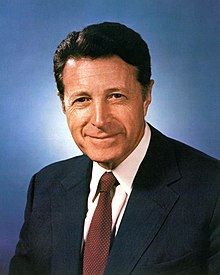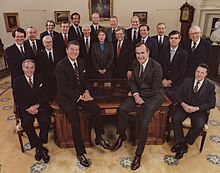Caspar Weinberger
Caspar Willard Weinberger , GBE (born August 18, 1917 in San Francisco , † March 28, 2006 in Bangor , Maine ) was an American politician . From 1981 to 1987 he was Secretary of Defense of the United States in the administration of President Ronald Reagan . The start of the Strategic Defense Initiative (SDI) and the Iran-Contra affair coincided with his tenure .
Life
Youth, studies and legal work
Born the son of a lawyer, Weinberger graduated from Harvard University with a bachelor's degree in 1938 and a Juris Doctor in 1941 . He joined the United States Army as a private in 1941 and served in the Pacific theater . At the end of the war he was a captain in the Military Intelligence of General Douglas MacArthur's staff. He developed an interest in politics and history early in his life. During the war years he became a great admirer of Winston Churchill , whom he later named as an important role model. Between 1945 and 1947 Weinberger worked as a research assistant for a federal judge and then worked as a lawyer until 1969.
Political career
California State Policy
Weinberger entered the California State Assembly in 1952 and was re-elected in 1954 and 1956. Although he failed his candidacy as Attorney General of California in 1958 , Weinberger remained in active politics and in 1962 became chairman of the California Republican Party . Governor Ronald Reagan appointed him chairman of the California State Government Organization and Economy in 1967 and appointed him finance director at the beginning of 1968, roughly comparable to a state finance minister in Germany .
Federal politics
In January 1970, Weinberger moved to Washington, DC , where he became chairman of the Federal Trade Commission and served as vice director from 1970 to 1972 and director of the Office of Management and Budget from 1972 to 1973 . Under Presidents Nixon and Ford , he was Minister of Health, Education and Welfare from 1973 to 1975 . Until Reagan was elected US President in 1980, he was Vice President and advisor to the largest US construction company, Bechtel Corporation .
Although Weinberger was not considered a defense expert, he enjoyed a reputation in Washington as an able administrative specialist. Through his energy as a cost reducer, he earned the nickname Cap the Knife (German: "Caspar the knife"). He also shared Reagan's belief that the Soviet Union posed a serious threat to the United States and that defenses should be modernized and strengthened. Contrary to his nickname, Weinberger became a staunch supporter of Reagan's plan to increase the defense budget in the United States Department of Defense . Readiness (combat), durability and modernization became the key words of his defense program.
As Secretary of Defense, he was responsible for the massive American armament that contributed to the collapse of the Soviet Union. Weinberger pushed for a dramatic increase in the American nuclear arsenal and was a staunch advocate of the controversial Strategic Defense Initiative to establish an orbital missile defense shield. He advocated the participation of Western European NATO partners in the US research program through his own development. In fact, all sensitive developments were reserved for the USA alone; the Federal Republic of Germany and other European countries should only cover a considerable part of the costs and contribute with conventional technology ("plumbing").
Weinberger gained defense policy profile in a speech at the National Press Club on November 28, 1984, in which he drafted six basic requirements (six tests) based on American experience with foreign missions , especially in Vietnam and Lebanon . This speech represented an early stage in the development of the later Weinberger-Powell doctrine .
In 1987, the revelations of the Iran-Contra affair about the sale of TOW guided missiles to Iran and the growing difficulties with the defense budget weighed on Weinberger. He resigned on November 23, 1987; the reason he gave the deteriorating health of his wife. The press, however, suspected that, as an opponent of the SALT II agreement, he was dissatisfied with the US-Soviet INF arms control agreement. He denied this, claiming that the contract was essentially his. This claim is countered by the fact that Weinberger had always emphasized that disarmament negotiations could only be conducted with the Soviet Union “from a position of considerably greater strength”. In this spirit, he had implemented the construction of the neutron bomb , ordered by President Reagan in August 1981, without taking the European NATO partners into consideration .
In 2000 Weinberger told the Swedish TV broadcaster SVT about the submarine incidents in Sweden in the 1980s that US Navy submarines had held exercises in Swedish waters in coordination with the Swedish Navy. The Swedish government was not informed of this.
Weinberger was Minister of Defense for six years and ten months. Only Robert McNamara and Donald Rumsfeld held office longer .
After leaving active politics
After Weinberger left the Pentagon, he became editor of Forbes Magazine , in which he frequently commented on defense and national security topics in the years that followed. Since 1988 Weinberger has been working as a lawyer again. Charges were brought against the Iran-Contra affair because of false statements made to the committee of inquiry. On December 24, 1992, however, a few days before the trial began, President George Bush Sr. amnestied.
From 1997 until his death in 2006 he was a member of the Project for the New American Century .
He wrote two novels with Peter Schweizer (one of them, Chain of Command , is a thriller about the assassination of the US president).
Private
In 1942, Weinberger married Rebecca Jane Dalton , a former army nurse who later became a writer and editor of children's books .
He died on 28 March 2006 at a hospital in Bangor , Maine from the effects of pneumonia and was a week later with military honors at the Arlington National Cemetery buried. Jane Weinberger outlived her husband by three years and died on July 12, 2009 at the age of 91 in Bar Harbor of complications from a stroke . The couple had a daughter, Arlin , and a son, Caspar Jr.
Fonts
- Fighting for Peace: 7 critical years at the Pentagon . Joseph, London 1990, ISBN 0-7181-3262-9 .
- The next war . Regnery, Washington DC 1996, ISBN 0-89526-447-1 .
- In the arena: a memoir of the 20th century . Regnery, Washington DC 2001, ISBN 0-89526-166-9 . (Co-author)
literature
- Caspar W. Weinberger , in: Internationales Biographisches Archiv 30/2006 from July 29, 2006, in the Munzinger archive ( beginning of the article freely available)
Web links
- Biography (archived version, English)
- In hostile depths - the superpowers' secret submarine warfare
- Caspar Weinberger at the Miller Center of Public Affairs at the University of Virginia (English)
- Caspar Weinberger in the database of Find a Grave (English)
Individual evidence
- ↑ cf. Weinberger, Caspar: The Uses of Military Force. ( Memento of December 29, 2009 in the Internet Archive ) (PDF; 67 kB) Speech of November 28, 1984, National Press Club, Washington, D. C., In: Air Force Magazine . n. d. Retrieved January 9, 2012.
- ↑ Sweden chases enemy submarines , article from March 8, 2000 on Rheinische Post
- ^ NATO submarines conducted exercises in Swedish waters. March 8, 2000, archived from the original on February 23, 2016 ; Retrieved January 20, 2014 .
- ↑ Paid pardon? , Article of February 5, 2001 on Spiegel Online
- ↑ Caspar Weinberger. Retrieved November 7, 2018 .
- ^ Douglas Martin: Jane Weinberger, Author Who Became Publisher, Dies at 91 . In: New York Times , July 15, 2009.
- ↑ Elaine Woo: Jane Weinberger dies at 91; author, publisher and wife of Defense secretary . In: Los Angeles Times , July 15, 2009.
| personal data | |
|---|---|
| SURNAME | Weinberger, Caspar |
| ALTERNATIVE NAMES | Weinberger, Caspar Willard (full name) |
| BRIEF DESCRIPTION | American politician |
| DATE OF BIRTH | August 18, 1917 |
| PLACE OF BIRTH | San Francisco , California |
| DATE OF DEATH | March 28, 2006 |
| Place of death | Bangor , Maine |






